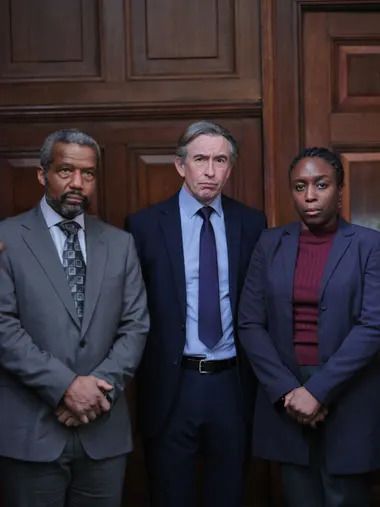
Stephen review – Steve Coogan is the cop who cracks the Lawrence case after 13 years of lies
A few lines across the screen sum up the dreadful story so far. “On 22 April 1993 18-year-old Stephen Lawrence was murdered in an unprovoked racist attack. The police failed to catch his killers. A public inquiry found the Metropolitan police to be incompetent and institutionally racist. In 2006, 13 years after their son’s murder, his parents are still fighting for justice.”
We begin in 2006, in ITV’s new three-part drama Stephen – scripted by Frank Cottrell-Boyce with every ounce of his customary compassion and intelligence. Stephen’s mother Doreen (Sharlene Whyte) gives a speech at the centre under construction, whose users she hopes will become her boy’s living legacy, and his father Neville (Hugh Quarshie, who also played him in the award-winning 1999 ITV docu-drama The Murder of Stephen Lawrence) attends yet another meeting with yet another group of reluctant officials, trying to secure a judicial review. They grant him a review of the case instead.
DCI Clive Driscoll (played, as has been loudly trumpeted, by Steve Coogan) volunteers for the job. Why? Because he thinks it can be solved “by common sense coppering”. It is, he notes – cutting through 13 years of unforced errors, obfuscation, arse-covering, corruption arising from bad policing, bigotry and malevolent intent – a straightforward case. So rather than simply review it, he takes his team back to the beginning to investigate the murder the way it should have been done the first time. “It is our privilege to be able to put that right … We’re starting on the basis that we’re more than a match for racist thugs.”
 Sharlene Whyte as Doreen Lawrence, Steve Coogan as Clive Driscoll and Hugh Quarshie as Neville Lawrence in Stephen.
Sharlene Whyte as Doreen Lawrence, Steve Coogan as Clive Driscoll and Hugh Quarshie as Neville Lawrence in Stephen.
There are moments when Driscoll seems just a little too good to be true; he knocks back colleagues who joke about “Saint Stephen Lawrence … embarrassing how we kowtow to that family”, for example. It is possible that a stronger dramatic actor than Coogan, who is a genius at other things, might have been able to do more with the difficult task of playing a genuinely good man. But perhaps that is just a function of one’s own cynicism. The man is, after all, just doing his job right. It is – it always was – a straightforward case. Perhaps it is the context making him look as if he sits only a little lower than the angels.
The reinvestigation allows the (re-)education of viewers about the findings of the Macpherson report and the staggering litany of failures and worse by the police. Witnesses were ignored or not called in to give statements for weeks, leaving plenty of time for them to be intimidated. The suspects’ names were reported to the police within hours but they were not arrested for a fortnight.
It is Driscoll’s insistence that all the forensic tests be redone – or in some cases, almost unbelievably, done for the first time, after the official forensic service declined to do some on the grounds that it wasn’t worth it for such a “brief attack”. What does such a phrase even mean, wonders Driscoll, then sends everything off to a private firm with instructions to carry out every procedure they can. It yields the first ever physical evidence tying the gang of suspects to Stephen’s body. The Lawrences cannot believe it. Neville is shaken. Doreen becomes only stiller.
Stephen folds the known facts and the known characters (and additions – there is the now standard disclaimer that some events and people have been created for the dramatisation) into a riveting story without letting the naturally more dramatic element of Driscoll, as he hunts down new evidence and tightens the focus on the killers, overwhelm the infinitely harder work done by the unswerving, unflinching Lawrence parents.
But the show’s greatest achievement is a more ineffable one. It somehow maintains the space where Stephen should be but where grief lives for the Lawrences instead. The shocking oversights by the police are all there but, rather than becoming point-and-gasp distractions, they are pressed always in the service of underlining the unspeakable loss and extra years of pain inflicted on top of what was already unbearable. Like Jimmy McGovern’s Anthony last year, about the racist murder of another 18-year-old black student, Anthony Walker, it does not allow you to forget about the life – years and years of it – unlived.










